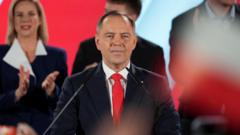The election of Karol Nawrocki, a nationalist backed by the former ruling party, complicates Prime Minister Tusk's ambition for a liberal agenda, highlighting Poland's deep political divisions.
Nationalist Victory in Poland's Presidential Election Challenges Centrist Leadership

Nationalist Victory in Poland's Presidential Election Challenges Centrist Leadership
Karol Nawrocki's election as president signals a tough road ahead for Prime Minister Donald Tusk's liberal policies amidst a growing right-wing populism in Europe.
In a surprising turn of events, Karol Nawrocki, a nationalist author and ex-boxer, has narrowly won Poland's presidential runoff election, presenting a significant challenge to the centrist government led by Prime Minister Donald Tusk. Official results announced on Monday revealed that Nawrocki, supported by the previous right-wing Law and Justice party, garnered 50.9% of the votes, edging past Rafal Trzaskowski, the liberal mayor of Warsaw, who received 49.1%.
Nawrocki's victory is seen as a boost to the right-wing populist movement gaining traction across Europe. Ahead of the election, former President Trump endorsed Nawrocki, further intensifying the political climate in Poland. In this polarized environment, the country now faces a scenario where governance will be obstructed by two opposing power centers—the presidency and the government.
Despite their differences, both sides agree on supporting Ukraine in its conflict with Russia and agree on strengthening Poland's military. However, these agreements are overshadowed by stark divergences on key domestic issues, such as the stringent abortion laws that were enacted during the Law and Justice party's previous tenure.
This electoral outcome comes shortly after voters in Romania rejected a nationalist candidate, causing hopes among liberal factions in Poland that the continent's wave of right-wing sentiment might be waning. Instead, Nawrocki's presidency is likely to reinforce the existing divides, complicating the implementation of Tusk's reforms while igniting debates surrounding national legislation and social policies.





















